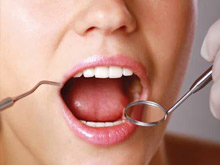Health Topics
-
Healthy Living
-
|
|
April 2012
|
| Mouth Chew It! |
| Dr Neeraj Verma |
| |
 |
Oral health is not only important to your appearance and sense of well-being, but also to your overall health. Cavities and gum disease may contribute to several serious conditions, such as diabetes and respiratory diseases. |
Untreated cavities can also be painful and lead to serious infections. Studies are also currently examining the possibility of a link between poor oral health and heart disease, and that between poor oral health and women delivering pre-term low birth weight babies.
Oral diseases share common risk factors with the four leading chronic disease brackets
- Cardiovascular diseases
- Cancer
- Chronic respiratory diseases
- Diabetes
Chronic Diseases Tied To Our Teeth
Our mouths are home to millions of microorganisms. While most of them are harmless, some cause tooth decay and oral infections. This can translate to not just cavities as we know it, but also to more serious health problems.
Heart Disorders: Recent research has associated heart disease and even strokes, with poor oral hygiene.
- Bad oral hygiene kills off the good part of High Density Lipoprotein (HDL) and Low Density Protein (LDL), both of which serve to carry naturally produced proteins from one organ to another. When these proteins do not reach their receptor organs, the latter’s functions are affected. The result is a host ofdiseases and collectively they can be the cause of heart attack.
- People with periodontal disease are known to be prone to coronary artery disease. Researchers aren’t sure why, though they have several theories. One is that oral bacteria can enter the blood stream by attaching themselves to fatty plaques and eventually cause clot formation. Another is that inflammation in the gums contributes to swelling in the arteries.
- There also appears to be a higher rate of gum disease among stroke victims.
All this can be prevented by consciously making time for brushing and flossing and ensuring that the gums are healthy.
Cancer: Oral and pharyngeal cancer is the sixth most common malignancy reported worldwide and is one with high mortality rate among all malignancies. The highest rates are reported in South Asian countries, so much so that the Indian sub-continent accounts for onethird of the world burden. Pregnancy Complications: In a review of studies published in the Journal of the American Dental Association, researchers concluded that oral bacteria and periodontal infection in a mother’s mouth can lead to foetal exposure. This in turn causes foetal inflammatory response, which can lead to pre-term delivery. Studies also show that when pregnant women with existing gum disease are subject to aggressive remedial treatment, the instances of pre-term low-weight births are significantly lowered.
Osteoporosis: The bone loss disease that is especially common in post-menopausal women also has connections to oral hygiene. The loss of bone mass in the lower jaw can lead to the loss of teeth. The risk is even higher among women with gum infection, making brushing and flossing as crucial in the second half of our lives as it was in the first.
|
Health Complications Which Threaten Oral Hygiene
Uncontrolled diabetes
- Poor glycemic control in diabetics is associated with gingivitis and severe periodontal diseases.
- Oral signs and symptoms of diabetes can also include a neurosensory disorder known as burning mouth syndrome, taste disorders, abnormal wound healing, and fungal infections.
- Diabetics may notice a fruity (acetone) breath or frequent dry mouth. It increases dental decay.
- High blood glucose levels in saliva let bacteria thrive. Therefore, uncontrolled diabetes and uncontrolled gum disease go together.
- Diabetics are at twice the risk for periodontal disease as healthy patients. Almost one-third of people with diabetes have severe periodontal disease.
- Inflammatory periodontal disease can also be a precursor of death from ischemic heart disease and heart attacks in patients with diabetes.
Chronic respiratory diseases
- Systemic diseases and the medications used to treat them, often cause adverse oral side effects, such as reduced salivary flow, altered senses of taste and smell, jaw and facial pain, overgrowth of the gums, bone loss and mobility of teeth.
- Patients with chronic respiratory diseases who use inhalers are also at higher risk for oral fungal infections and chronic respiratory diseases.
- Also, numerous medications cause dry mouth, which leads to cavities.
|
|
7 Ways to Take Charge of your Oral Health
- Brush with a soft toothbrush twice a day, and floss too.
- Visit a dentist regularly.
- Eat wisely – avoid snacks with sugars and starch. Limit the number of snacks
eaten throughout the day.
- Eat the recommended five-a-day helping of fibre-rich fruits and vegetables.
- If diabetic, maintain control over blood sugar to prevent complications.
- Avoid tobacco and limit alcohol.
|
|
 |
Dr Neeraj Verma is Senior Consultant Dental Surgeon Indraprastha Apollo Hospitals New Delhi |
|
|